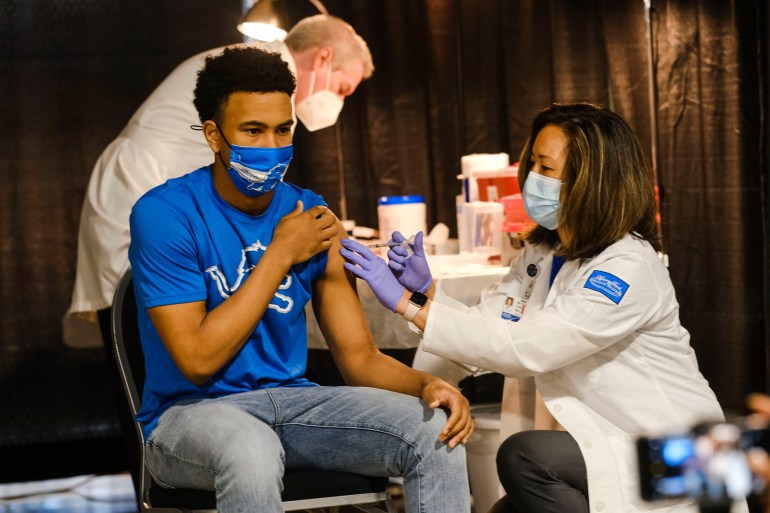The pediatrician told Melissa Zajacz of Medina, Ohio, that her 13-year-old son, Spencer, would be back to school in two weeks after he was diagnosed with Covid-19. Then came more trips to the doctor, fevers over 104 degrees and two visits to the Cleveland Clinic emergency room.
Spencer’s case, involving the B.1.1.7. variant, has kept him mostly bedridden and suffering headaches and swollen ankles since March 17. “There is no cure, so they offer support care,” said Melissa Zajacz. “He hasn’t been to school in a month. He’s a healthy, athletic kid, and he’s miserable.”
Throughout previous waves of Covid, children and young adults eluded the pandemic’s gravest consequences, exhibiting mild symptoms or none at all. Now faster-spreading variants are sending more to the hospital. Fatalities remain low, but doctors say the virus is now making the young sicker, some gravely.
Cautionary tales are beginning to multiply. University of Alabama students are mourning the death of the basketball team’s unofficial mascot, Luke Ratliff, a 23-year-old plaid-clad campus fixture. The student affectionately known as Fluffopotamus died from Covid-19 complications early this month as the team went on an NCAA tournament run.
In Michigan, where Covid-19 is spreading at one of the planet’s fastest rates — an average of almost 8,000 new cases a day — hospitals are seeing far more youths. The state’s Department of Health and Human Services reported 50 pediatric cases in hospitals Thursday, the most since the post-holiday surge in early January.
“Statewide, the hospitalization rates are higher, therefore they must be sicker,” said Rudolph Valentini, chief medical officer for Children’s Hospital of Michigan in Detroit. “We’re seeing more kids coming to ER across the state. Some are in ICU, and some require mechanical ventilation.”
The new Covid-19 variants are more contagious and hit young people harder than the original virus that emerged more than a year ago, when people under 30 often showed no symptoms.
“We are seeing patients 20, 25, 35 who are quite ill with Covid,” Robert Riney, chief operating officer for Henry Ford Health System, said in an April 8 briefing. “The good news is the mortality rates are lower, but these are not light cases.”
The same trend is showing up across the U.S. as young people, who often aren’t yet vaccinated, spread and contract the virus through school sports and social gatherings. Most states have focused vaccination efforts on residents over 65 because they’re most vulnerable.
‘Very Different’
Illinois’s state-supported mass vaccination sites are opening appointments for college students because younger people are driving its recent surge. The state’s highest case counts in April have been among 20-somethings, after cases in the 18- to 24-year-old age group doubled over the last month, according to the Illinois Department of Public Health.
At a news briefing last week, Allison Arwady, Chicago Public Health Department commissioner, said the city is “seeing more of the increased hospitalizations among people under 50 — very different from what we had seen previously.”
 A group of teenagers serving as ‘Covid-19 Student Ambassadors’ joined Governor Gretchen Whitmer to receive a dose of the Pfizer Covid vaccine to promote and encourage Michigan residents to go and get their vaccines in Detroit, Michigan, US [File: Matthew Hatcher/Getty Images]
A group of teenagers serving as ‘Covid-19 Student Ambassadors’ joined Governor Gretchen Whitmer to receive a dose of the Pfizer Covid vaccine to promote and encourage Michigan residents to go and get their vaccines in Detroit, Michigan, US [File: Matthew Hatcher/Getty Images]About 62% of Chicago residents 65 and over have gotten at least one dose and 47% are fully vaccinated, which is helping improve hospitalization rates in that age group. When everyone 18 and over are included, about 46% of residents have received a first dose.
In New Jersey, 48% of new hospitalizations are patients 60 and younger, “a shift from prior experience,” Health Commissioner Judith Persichilli said at a recent virus briefing. A week ago, 11% of new hospitalizations were 30- to 39-year-olds, 10% were 40 to 49, and 21% were 50 to 59.
Packed Hospitals
Colorado Governor Jared Polis said this month that cases among residents over 50 are leveling off, which he attributed to a strong turnout for vaccinations. He said the biggest increase in cases is among adults younger than middle age.
“People are filling up hospitals in the 18-to-50 age group,” he said. “This is a race against the clock.”
Polis said the new variants are increasing the likelihood of severe reactions. Most younger people infected will survive, but are more likely to end up in the hospital, he said, imploring residents to continue wearing masks and practicing social distancing as the inoculation campaign nears its goal.
“Let’s be careful in the final weeks,” Polis said. “We’re almost back to normal. It’s almost mid- to late-May, where everyone who wants a vaccine can get it. Let’s not have a setback.”
The next problem may be cases of Multisystem Inflammatory Syndrome, in which multiple organs become inflamed. MIS-C, as it’s called, afflicts some Covid survivors with lingering symptoms such as high heart rates, body aches and fatigue.
Though the syndrome is rare — Michigan has about 100 cases — hospitals likely will see more of it after the variant-driven surge, because it trails Covid by two to five weeks, said Valentini, of Children’s Hospital in Detroit.
Katie Krol of Shelby Township, Michigan, said her two children have been struggling with MIS-C. Her daughter, Emma, now 10, and 14-year-old son, Rhys, saw their conditions worsen about two months after initially getting Covid in March 2020. Their heart rates sometimes spike above 140. Both are often exhausted and have circulatory problems.
Rhys’s “hands and feet will turn purple,” Krol said in an interview. “You can trace their veins. They are darker. If Rhys is up for longer than 15 minutes, he says he feels like his feet are swelling.”
Doctors have found no cure.
“They don’t know,” Krol said. “They are saying in six months or in 12 months, they will be better. There is no answer for this. I wish it was something where there was an answer and we could just get treated.”
Valentini said hospital officials are heartened by the fact that Pfizer Inc.’s vaccine is showing strong results with 12- to 15-year-olds. But the drugmaker is waiting for the Food and Drug Administration to approve its use for that age group. Moderna Inc. in February started a study for patients as young as 12.
Until children can get the vaccine, they will be susceptible. “Corona is looking for a place to land,” Valentini said. “The patients who are most vulnerable are children because they haven’t been vaccinated.”
Zajacz, the Cleveland mother, said that a medical scan Thursday revealed that Spencer’s spleen is enlarged, and she plans to try to have him admitted to a special clinic for patients with longstanding Covid symptoms.
“We don’t see a light at the end of the tunnel with this,” she said. “The answer they all have is that we just have to let it run its course.”
–With assistance from Shruti Date Singh, Vincent Del Giudice and Stacie Sherman.




